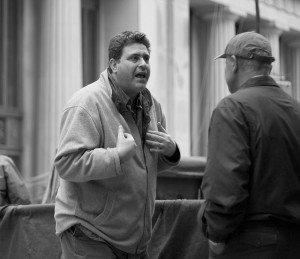Phenomenology as dialogue: A researcher’s reflection
Aug 1st, 2013 | By Marc Applebaum | Category: Feature The way we creatively embody and express the traditions we inherit, whether philosophical or psychological, is inevitably shaped by our own history, background, and values.
The way we creatively embody and express the traditions we inherit, whether philosophical or psychological, is inevitably shaped by our own history, background, and values.
In my case, before I began my study of phenomenology I had already worked as a teacher and counselor. I’ve been a teacher of one kind or another since I was a teenager: my students have ranged in age from pre-school children to teens to the adults to whom I teach qualitative research methods at Saybrook graduate school. I spent eight years counseling formerly homeless adults in San Francisco’s community mental health system, often in the aftermath of emergency psychiatric hospitalizations. My weekly sessions with them focused on supporting their efforts to maintain a more stable and intact life in the community. I have worked for more than a decade as an organizational coach and consultant in the San Francisco Bay Area, helping business founders and executives to lead, communicate more effectively, and create sustainable workplaces. What we call “coaching” occurs through dialogue: an ongoing clarification of their lived-values, both personal and professional, and the decisions that flow from those values in response to challenges and conflicts in the business. So teaching, counseling, coaching: all of these are intrinsically dialogical activities.
Given this background it’s not strange that I would view phenomenological psychology as dialogical, in the sense that its ultimate aim is to inform not just the way we understand others, but the way we engage in the intersubjective, lived-world, which means the social world of interrelationship and the development of shared (not solitary) understanding.
Psychotherapy and counseling are obviously relational activities founded upon dialogue. It’s less obvious that phenomenological psychological research is similarly dialogically-directed, because books and journal articles, even blog posts, can seem to be purely monological: the sound of one voice articulating its own insights by itself.
 In an important sense, of course, scholarly work is always in dialogue with the wider academic community—our peers are our potential interlocutors. At least we hope for such exchanges. As a minority and far-flung movement, phenomenological psychologists have to seek out each other, since our passions and aims are largely marginal to mainstream psychology. We also benefit tremendously from interdisciplinary dialogue, for example with philosophers, sociologists, even social economists.
In an important sense, of course, scholarly work is always in dialogue with the wider academic community—our peers are our potential interlocutors. At least we hope for such exchanges. As a minority and far-flung movement, phenomenological psychologists have to seek out each other, since our passions and aims are largely marginal to mainstream psychology. We also benefit tremendously from interdisciplinary dialogue, for example with philosophers, sociologists, even social economists.
But more importantly, isn’t psychological research always intrinsically aimed beyond the academy, at informing praxes in the lived-world? Or are we merely talking to ourselves? A kind of professional solipsism is obviously a risk in any academic specialization: that we are driven to a narrower and narrower niche, with the result that the life-world—which as phenomenologists, ought to be our primary concern—is practically lost in the footnotes. It seems to me this problem is intrinsic to any scholarly discipline, and parallels Husserl’s analysis in the Crisis regarding the sciences’ loss of their intuitive ground. Similarly, our own work can demonstrate what Husserl (1970) called “the tendency to superficialize itself in accord with technization” (p. 48).
In my case, the way that I embody phenomenology is intrinsically and necessarily not limited to one form of activity. If, in addition to being a researcher, I were a psychotherapist, the therapeutic encounter would be at least as important a locus and expression of my phenomenologizing as is my teaching and publications.
Similarly, in my organizational consulting, my weekly sessions with clients are an occasion to employ the bracketing, epoché, and free imaginative variation spontaneously and dialogically in an effort to clarify with others what they are living, and how to meet it. If I were to summarize this activity, I’d say it is a descriptive search for a more essential description of an intersubjective structure that’s being implicitly lived by someone within a given organizational context, and then a hermeneutic effort, in dialogue with the other person, to apply the insight yielded through description. This sense of “application” is fruitfully contrasted with Gadamer’s use of the term; as Donatella Di Cesare has recently written, for Gadamer “application does not simply come after, but is rather the cornerstone of, understanding“ (p. 97). Acknowledging the useful distinction made within the hermeneutic literature, as phenomenologists we can say: we seek not only knowledge, but understanding.
Regarding the multiple worlds within which I work, if I were to try to rigidly privilege the phenomenologically-informed applications that occur in my consulting practice over scholarly research, I suppose I’d need to disparage scholarly research as mere intellectualism.
But I could never be so reductive, because the activity of phenomenological research is a fascinating, dynamic experience of disclosure framed by a method—in my case, that of Giorgi (2009)—for which I’m supremely grateful. His descriptive research method is a unique and precious bridge between phenomenological philosophy and the effort to contribute to a human science of psyche.
If on the other hand I were to try to rigidly privilege my scholarly research and teaching over organizational work in the world with people, I would need to reductively frame organizational consulting as mere problem-solving, a mechanical exercise in addressing natural-attitude issues, driven by money-making, within a commercial, materialistic context.
But the reason I’ve been invited into a business in the first place is precisely to ally with leaders in seeking to confront practical problems in a more fully human way—in other words, to help them explicate and work through the implications of the meanings that they’re living, or resisting living.
 Which is why in so many cases, the business problems with which I’m called upon to assist people are essentially ethical issues: struggles over core values related to responsibility, loyalty, judgment or forgiveness, the struggle to cope with the profit-driven imperatives of a business in a humane way. In other words: a sample of the fundamental problems of living in the social world. I don’t paint a rosy picture of the business world—it’s no better or worse than academia: it’s another human context, as full of ambivalences, aspirations, subjugations, hopes, successes and abject failures as any other collective human activity.
Which is why in so many cases, the business problems with which I’m called upon to assist people are essentially ethical issues: struggles over core values related to responsibility, loyalty, judgment or forgiveness, the struggle to cope with the profit-driven imperatives of a business in a humane way. In other words: a sample of the fundamental problems of living in the social world. I don’t paint a rosy picture of the business world—it’s no better or worse than academia: it’s another human context, as full of ambivalences, aspirations, subjugations, hopes, successes and abject failures as any other collective human activity.
I have some colleagues who see these two worlds as not merely different but fundamentally incompatible. On the other hand, some colleagues immediately understand how one kind of work can enrich and inform the other. I don’t argue everyone ought to try to bridge multiple disciplines. But neither is mine a situation of “serving two masters” (Matthew 6:24); that’s entirely the wrong metaphor. It’s more analogous to being a pianist who plays both classical and jazz: one seeks to be a polymath.
By temperament, I have a horror of becoming locked into merely one way of seeing things. Adopting one fixed way of seeing, however engaging it may be, strikes me as dogmatic. Phenomenology, for me, is first and foremost a path of inquiry that yields insights bearing on living and practicing in the social world. It’s a way of seeing and exploring, with others, that is thoroughly dialogical because its aim is the shared world, not solitary insight. In my case, the dialogue is with others, and it’s also between various lived-worlds: academia, the corporate world, and the world of cultural/religious psychology. All of these are in play somewhat anarchically in my life, but for me that play is enlivening and renewing.
References
Di Cesare, D. (2012) Gadamer: A philosophical portrait (N. Keane, Trans.). Bloomington: Indiana University Press.
Giorgi, A. (2009). The descriptive phenomenological method in psychology: A modified Husserlian approach. Pittsburgh: Duquesne University Press.
Husserl, E. (1970). The crisis of European sciences and transcendental phenomenology (D. Carr, Trans.). Evanston: Northwestern University Press.
Photo credits
Two men John Fraissinet via photo pin cc
“Conversation” by Chris Blakely
 Follow
Follow email
email
Dr. Applebaum, I really appreciate your writing here. As a clinician who does not have a formally academic or research oriented approach I have found the principles and methods you refer to here, as I have learned them and practiced them, to be very helpful in dialogue with my clients. In dialogue with my clients I help them describe the contents of their experience in a way that they can not only see it more clearly and perhaps objectively, but also through that process of description they can understand their world and interact with it in a more mutual way, including in the microcosm of the therapy session.
Yes you know, how dialogue is different in therapy versus a research interview is an interesting question. But in both cases, the ground of the situation is a meeting between two people. If we suppress that, we’re neglecting the most obvious human dimension of the situation, aren’t we?
Also I think you’re implying that articulating one’s own experience (as a client in therapy) is not only a way of gaining private insight, but also of engaging in the world communicatively. That’s an interesting point!
Dear Marc:
As a teacher/researcher I can relate to your intention for participating in the world in a dialogic manner. One of the struggles I have been negotiating as a second career academic is the “narrower and narrower niche [of the academic]..with the result that the life-world…is practically lost in a foot note” as you so eloquently described. With this daily, larger than life reality, I believe the only way to live in this life-world is to provide spaces for dialogue. Duoethnography (Norris & Sawyer, 2012) is a methodology that opens the space for this kind of transparency where two people of difference can potentially come together and not necessarily coalesce at the level of sameness but rather at the level of a deeper understanding which I ‘heard’ in your blog. I use it both professionally and with my students who are teacher candidates embarking on a career in which they will invariably engage with people of difference on a daily basis. I enjoyed your writing very much. Thank you for the Giorgi reference which I will follow up with for potential use in my future qualitative methods course.
Namaste
Hilary
Norris, J., & Sawyer, R. D. (2012). Toward a dialogic methodology. In J. Norris, D. S. Sawyer & D. Lund (Eds.), Duoethnography: Dialogic methods for social, health, and educational research. Walnut Creek, CA: Left Coast Press.
Thanks Hilary. I think that there’s a fruitful tension at work in preserving both the scientific aim of qualitative research, and the dialogical intention at the same time. Thanks for the reference to the ethnographic book. I think the research situation is a complex one…we don’t want to fall into a falsely empirical way of grasping our own or the other’s presence in the interview situation. The way that the researcher and the participant are present involve, I think inevitably, multiple modes of being-a-subject. For example, without some kind of felt personal connection, rapport, why would someone describe an intimate moment of their live, in a candid way?
On the other hand, I’m doubtful about framing the participant as a “co-researcher” since that seems to imply an complete equivalence of the roles, which can’t be right either–I mean, I don’t expect my participants to be trained phenomenologists, and even if they were, I wouldn’t be asking them to engage as such analytically in their own interview, but instead to speak spontaneously from their experience–rather than speak phenomenologically “about” their experience, which psychologically implies a very different attitude. The more I explore the implications of dialogue in research, and dialogical interventions, the more interesting this territory becomes!